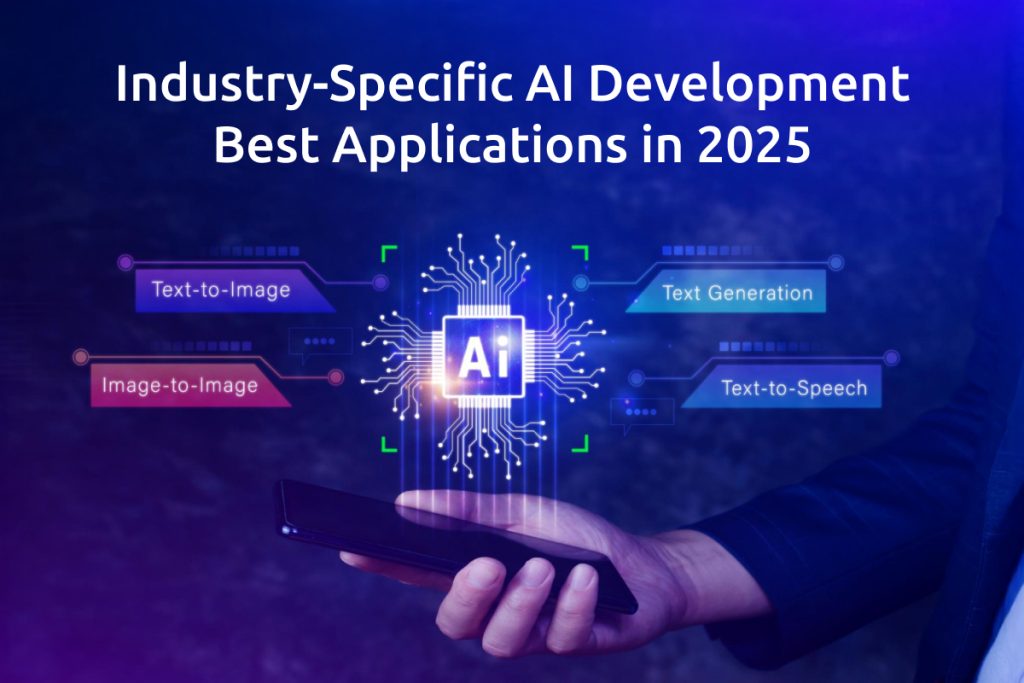Industry-Specific AI Development: Best Applications in 2025
Table of Contents
Toggle
Artificial Intelligence (AI) has reached a point in 2025 where it’s not just an experimental tool for research labs but a practical foundation for businesses across industries. From finance to retail, from healthcare to logistics, every sector is now applying AI in ways that directly support growth, decision-making, and efficiency. What makes AI stand out today is its industry-specific approach. Rather than offering generic solutions, companies are adopting AI Development Services that are purpose-built for their unique business needs.
This blog takes a closer look at how AI is being applied in different industries in 2025, exploring the most effective use cases, the role of specialized providers, and the technologies shaping the future of work.
Why Industry-Specific AI Development Matters
In the early stages of AI adoption, businesses often relied on one-size-fits-all models. While these had their advantages, they rarely addressed the specific challenges of an industry. For example, a banking institution has very different compliance needs compared to a hospital or a logistics company. By focusing on industry-specific development, businesses can now align AI directly with their operations, resulting in solutions that actually deliver measurable outcomes.
This has given rise to the demand for a skilled AI Development Company that understands not only the technology but also the nuances of each industry. Companies today don’t just want generic automation; they need AI systems that work with their regulations, customer behavior, and workflows.
Best Applications of AI Across Industries in 2025
1. Healthcare: Smarter Diagnostics and Patient Care
Healthcare continues to be one of the most AI-driven industries. Hospitals and clinics are applying AI models to speed up medical imaging analysis, predict patient risks, and provide clinical decision support. Instead of doctors spending hours analyzing MRI or CT scans, AI systems flag abnormalities within minutes.
In 2025, AI is also supporting personalized patient care. By analyzing genetic data, lifestyle habits, and historical records, systems can recommend preventive treatment plans. Virtual health assistants powered by Custom AI Development Services are now common, providing patients with quick responses to health queries and medication reminders.
The real breakthrough lies in predictive diagnostics, catching potential health issues before they escalate. This doesn’t replace medical professionals but augments their decision-making capacity with accurate insights.
2. Finance: Risk Management and Fraud Detection
Financial institutions are using AI to monitor millions of transactions in real time. Fraud detection models are far more sophisticated today, capable of identifying unusual spending behaviors instantly. Instead of long verification processes, AI now provides near-instant alerts to both banks and customers.
Credit scoring has also become smarter. Instead of relying only on traditional credit history, AI systems analyze digital footprints, spending patterns, and behavioral data to create fairer scoring systems. For investment firms, AI predicts market trends and supports portfolio management, reducing risks in volatile conditions.
The integration of AI Consulting Services in finance has helped companies comply with global regulations while also delivering better customer experiences. In 2025, AI is not only a back-end tool but also a customer-facing service, with chatbots handling financial queries and guiding users through processes like loan approvals.
3. Retail: Personalized Shopping Experiences
Retail is seeing a significant impact from AI, particularly in the realm of personalization. Online platforms now use advanced recommendation engines that go beyond “customers also bought.” They consider browsing habits, purchase history, and even time of day to suggest products.
AI-driven inventory management is another major application. Retailers can now predict which products will be in demand in specific locations and adjust their supply chains accordingly. This reduces wastage while keeping shelves stocked with items that customers actually want.
In physical stores, AI is supporting cashier-less checkout systems, real-time customer assistance, and even store layout optimization. Full-Stack AI Development plays a big role here, as it combines front-end applications (like personalized apps) with back-end systems (like stock management), creating a connected retail experience.
4. Manufacturing: Predictive Maintenance and Automation
Factories are adopting AI to reduce downtime and increase efficiency. Predictive maintenance systems analyze machine data to identify when a part is likely to fail, allowing replacements before costly breakdowns happen. This minimizes production losses and keeps operations running smoothly.
Robotics combined with AI is improving assembly lines. Machines can now adjust themselves to different production needs without requiring extensive reprogramming. For manufacturers, this means they can switch from producing one product to another faster, with less disruption.
Supply chain optimization is another growing area. AI models forecast demand, plan shipping routes, and help reduce delays caused by external factors like weather or port congestion. With AI Integration Services, manufacturers are linking data from multiple systems, machines, logistics partners, and sales channels into one coordinated framework.
5. Logistics and Transportation: Smarter Route Planning
The logistics sector has always relied on optimization, but AI has taken it to another level in 2025. Companies are now applying AI for real-time route planning, taking into account live traffic, weather conditions, and delivery deadlines. This reduces fuel consumption and shortens delivery times.
In shipping, AI systems help track cargo globally, predict customs delays, and optimize container utilization. Autonomous delivery vehicles and drones, once experimental, are now being tested in select urban regions. These rely on Generative AI Development to continuously train navigation models in simulated environments before deploying them in real-world conditions.
For transportation companies, predictive demand analysis allows them to allocate vehicles more effectively. Instead of reacting to demand surges, they can prepare fleets ahead of time.
6. Education: Intelligent Tutoring Systems
The education sector has shifted significantly toward digital platforms, and AI plays a central role in supporting learners. Intelligent tutoring systems provide personalized lessons, adapting content to each student’s pace and learning style.
In 2025, universities are using AI to support research as well. Automated systems help scholars analyze massive data sets, spot trends, and even suggest hypotheses. On the administrative side, AI assists with admissions, student performance tracking, and scheduling.
With the help of Custom AI Development Services, educational platforms are building AI assistants that can answer student queries, support teachers in grading, and make education more accessible globally.
7. Real Estate: Smarter Property Valuation
AI is helping buyers, sellers, and real estate agents make better decisions. Property valuation models now consider a wide range of factors, including neighborhood trends, market history, and local amenities. This results in more accurate pricing.
For buyers, AI-powered platforms provide recommendations based on personal preferences, budget, and commuting needs. For property managers, AI predicts maintenance needs and tenant behavior, helping with long-term planning.
AI Development Services are also supporting virtual property tours, where potential buyers can explore properties online with interactive guidance.
8. Energy: Grid Management and Sustainability
The energy sector is one of the most complex, and AI is helping manage demand, reduce waste, and improve renewable adoption. Smart grids powered by AI adjust energy distribution in real time, balancing supply and demand more efficiently.
In renewable energy, AI predicts solar and wind power generation based on weather conditions, ensuring better integration into existing grids. For energy companies, predictive maintenance of turbines and infrastructure is reducing downtime.
Consumers are also benefiting. AI-driven applications help households monitor their energy usage, compare tariffs, and reduce costs. With AI Development Company expertise, many energy providers are now focusing on large-scale data integration for smarter operations.
The Role of Specialized AI Development in 2025
While AI applications differ by industry, one thing remains constant: businesses need solutions that actually work for their unique needs. This is where specialized providers play an important role. Companies offering Custom AI Development Services are building systems from the ground up, aligning technology with business goals.
Providers skilled in Full-Stack AI Development bring together everything from front-end interfaces to back-end analytics, making sure the entire ecosystem works smoothly. Others focus on niche offerings such as Generative AI Development for content creation or AI Integration Services that connect existing business systems with new AI tools.
For businesses unsure about how to begin, AI Consulting Services provide strategic guidance, helping them choose the right approach and avoid unnecessary costs.
Looking Ahead
As we move deeper into 2025, industry-specific AI applications are no longer just experiments; they’re becoming standard practice. Healthcare, finance, retail, logistics, and other sectors are already seeing the benefits of adopting focused solutions. What sets successful businesses apart is their ability to combine the right strategy with the right technical expertise.
Companies exploring AI should consider working with partners who not only understand the technical side but also the industry they operate in. For those looking to explore possibilities, firms like WebClues Infotech bring practical experience in building scalable AI systems that work across multiple industries.
- Arts & Style (98)
- Automobile (283)
- Business (5,518)
- Business and Entrepreneurship (162)
- Career Development (54)
- Climate & Environment (26)
- Creative (31)
- Culture (1,530)
- Beauty (276)
- Skincare (239)
- Cultural Studies (74)
- Digital Life (72)
- Energy Healing (31)
- Fashion (1,017)
- Clothing (688)
- Fashion Design (232)
- Philosophy (7)
- Morality (6)
- Religion (17)
- Sports (116)
- Beauty (276)
- Digital Marketing (331)
- DIY and Crafts (13)
- Economics (8)
- Education (1,260)
- Entertainment (195)
- Faith & Spiritual (10)
- Fashion and Beauty (152)
- Finance and Money Management (204)
- Fitness and Exercise (32)
- Food and Drink (169)
- Game (139)
- Health and Wellness (1,083)
- Home and Garden (378)
- Law (141)
- Lifestyle (1,349)
- Health (672)
- Home (380)
- Architecture (94)
- Interior Design (215)
- Rental Property (27)
- Pets (75)
- Relationships (70)
- Restaurants (19)
- Literature (7)
- Media (267)
- Packaging (41)
- Politics (1)
- Real Estate (254)
- Science and Nature (14)
- SEO (134)
- Social Media Marketing (51)
- Software Development (216)
- Sports and Fitness (44)
- Technology (832)
- Artificial Intelligence (238)
- Blockchain (60)
- Data Science (113)
- Gadgets (144)
- Security (139)
- Transportation (106)
- Travel & Tourism (736)
- Uncategorized (1,798)
- World (62)
- International (59)
- How to Prepare for a Jet Ski Ride in Dubai

- Choosing the Right Home Health Agency in Port Charlotte, FL: A Complete Guide

- Borden Ventures: Transforming the Future of Television with Smart Investor Partnerships
- Enhancing Sperm Quality: Lifestyle and Dietary Interventions

- Top Python Libraries for AI Projects You Should Know

How to Prepare for a Jet Ski Ride in Dubai

Top Python Libraries for AI Projects You Should Know

Reliable Local Towing Service Florida – 24/7 Roadside Help You Can Trust

Industry-Specific AI Development: Best Applications in 2025
